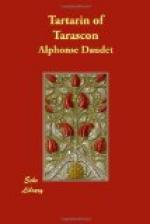Then a bell rang. There was a rumbling noise of wheels. A piercing whistle split the heavens... All aboard!... All aboard!... Goodbye Tartarin!... Goodbye Tartarin!. “Goodbye everyone” murmured the great man, and on the cheeks of the brave Commandant Bravida he planted a farewell salute to his beloved Tarascon. Then he hurried along the platform and got into a carriage full of Parisian ladies, who almost died of fright at the appearance of this strange man with his revolver and rifles.
Chapter 11.
On the first day of December 186-, in the clear bright winter sunshine of Provence, the startled inhabitants of Marseille witnessed the arrival of a Teur. Never had they seen one like this before, though God knows there is no shortage of Teurs in Marseille. The Teur, need I tell you, was none other than Tartarin de Tarascon, who was proceeding down the quay followed by his case of arms, his medicine chest and his preserved foods, in search of the embarkation point of the Compagnie Touache and the ferry-boat “Le Zouave” which was to carry him away.
His ears still ringing with the cheers of Tarascon and bemused by the brightness of the sky and the smell of the sea, Tartarin marched along, his rifles slung on his shoulders, gazing around in wonder at this marvellous port of Marseille, which he was seeing for the first time and which quite dazzled him. He almost felt that he was dreaming and that like Sinbad he was wandering in one of the fabulous cities of the Thousand and one Nights.
As far as the eye could see, there stretched a jumble of masts and yards, criss-crossing in all directions. The flags of a multitude of nations fluttering in the wind. The ships level with the quay, their bowsprits projecting over the edge like a row of bayonets, and below them the carved and painted wooden figureheads of nymphs, goddesses and saintly virgins from which the ships took their names. From time to time, between the hulls one could see a patch of sea, like a great sheet of cloth spattered with oil, while in the entanglement of yardarms a host of seagulls made pretty splashes of white against the blue sky. On the quay, amid the streams which trickled from the soapworks, thick, green, streaked with black, full of oil and soda, there was a whole population of customs officers, shipping agents, and stevedores with trollies drawn by little Corsican ponies. There were shops selling strange sweetmeats. Smoke enshrouded huts where seamen were cooking. There were merchants selling monkeys, parrots, rope, sailcloth and fantastic collections of bric-a-brac where, heaped up pell-mell, were old culverins, great gilded lanterns, old blocks and tackle, old rusting anchors, old rigging, old megaphones, old telescopes, dating from the time of Jean Bart.
There were women selling shellfish, crouched bawling beside their wares, sailors passing, some with pots of tar, some with steaming pots of stew, others with baskets full of squid which they were taking to wash in the fresh water of the fountains. Everywhere prodigious heaps of merchandise of every kind. Silks, minerals, baulks of timber, ingots of lead, carobs, rape-seed, liquorice, sugar cane, great piles of dutch cheeses. East and west hugger-mugger.




